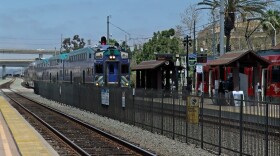BP and the Coast Guard sent oil-scooping skimming ships in the Gulf of Mexico back to shore Tuesday because nasty weather from Tropical Storm Alex churned up rough seas and powerful winds.
U.S. Coast Guard Lt. Dave French said all efforts had been halted for now off the Louisiana coast. Efforts also had been halted off the coasts of Florida and Alabama.
French said workers were using the time off the water to replenish supplies and perform maintenance work on equipment.
"We're ready to go as soon as conditions allow us to get those people back out and fighting this oil spill," French said.
The loss of skimming work combined with 25 mph gusts driving water into the coast has left beaches especially vulnerable. In Alabama, the normally white beaches were streaked with long lines of oil, and tar balls collected on the sand. One swath of beach 40 feet wide was stained brown and mottled with globs of oil matted together.
Waves were as high as 12 feet Tuesday in some parts of the Gulf. Forecasters expect the storm to strengthen to hurricane status later Tuesday.
The strongest part of the storm is expected to hit near the Texas-Mexico border. High waves are expected to move more oil onto shore, but the choppy water could also help break up the crude, and the high winds could cause it to evaporate faster.
The surging waves and nasty weather make skimming work unsafe and ineffective, and also can mangle oil-soaking boom.
The Coast Guard had to evacuate workers and equipment from coastal areas in Terrebonne Parish because of tidal surges that could cause flooding, French said.
The only vessels left in the water are being used to capture or burn oil and gas leaking from the well, and to drill relief wells that officials say are the best hope for stopping the leak for good.
Wayne Hebert, who helps manage skimming operations for BP, said it was impossible to say when the work might resume.
"I don't control the weather," he said.
All of the uncertainty of what Alex and other storms could do to BP's containment effort gave new urgency to the company's efforts to make its operations at the well as hurricane-resistant as possible.
The company said it hopes to install a new oil-capturing system by next week that would allow BP to disconnect the equipment faster if a hurricane threatens, and hook it back up quickly after the storm passes. Right now, BP would need five days to pull out if there is a hurricane. The new system being developed, which uses a flexible hose, would cut that to two days.
The containment system now in place is capturing nearly 1 million gallons per day from the well, which is spewing as much as 2.5 million gallons a day, according to the government's worst-case estimate.
BP has cut the federal government a $69 million check to help pay for cleanup efforts. Last month, the government sent the company a bill for all the government ships, planes and personnel working on the spill. The company also is offering financial help to owners, operators and suppliers of BP gas stations in the U.S. Some stations have reported sales declines in the wake of the spill.
Meanwhile, the State Department said the U.S. will accept help from 12 countries and international organizations in dealing with the spill. The identities of all of the countries and groups were not immediately announced. One country was cited in the State Department statement -- Japan, which is providing two high-speed skimmers and fire containment boom.
Also Tuesday, Vice President Joe Biden was visiting with local officials along the Gulf Coast.
At a seafood shop in New Orleans, he said the oil spill means Gulf Coast families will suffer through a lean summer and fall.
"The crisis doesn't end when the oil stops flowing out of the floor of the Gulf," he said, "so our efforts are not going to end once that well is capped."
The vice president also met with Louisiana Gov. Bobby Jindal and other officials leading the federal response to the spill. Fishermen have complained that they're not sure which waters are open, and often find out at the last minute that areas they planned to fish are closed. Biden says the National Oceanic and Atmospheric Administration and the Food and Drug Administration will strive to open areas as soon as possible. Fish are being tested for oil compounds to determine if they've come in contact with the spill.
Copyright 2022 NPR. To see more, visit https://www.npr.org. 9(MDAzMjM2NDYzMDEyMzc1Njk5NjAxNzY3OQ001))






